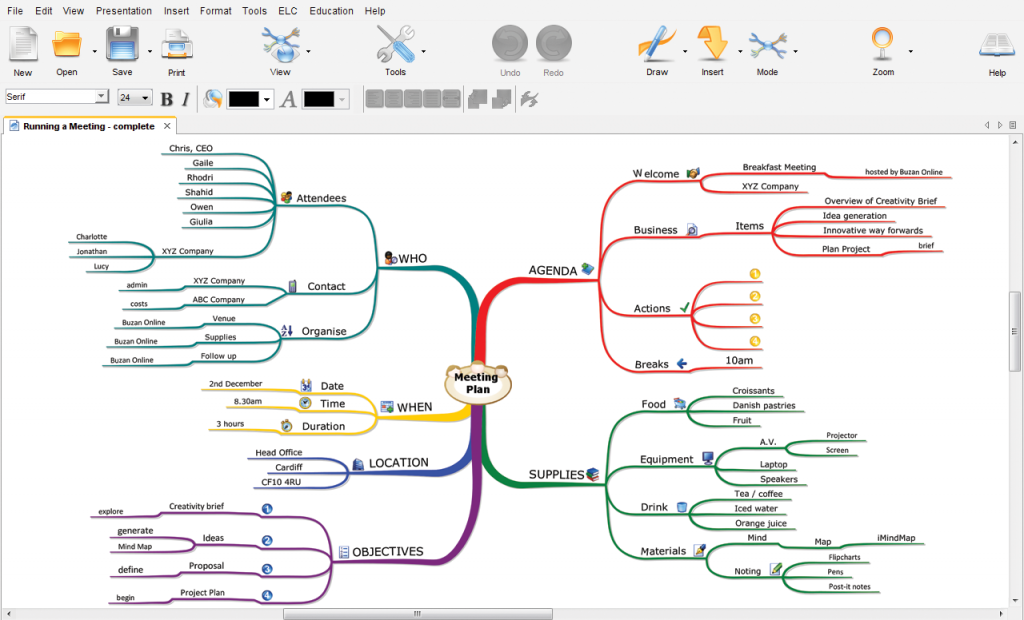Mind Maps for Business
We’ve used Mind Maps at ReSource since the very beginning – our first edition contained a hand drawn map of the contents, and Tony Buzan has been a regular contributor covering areas from business to creativity and poetry. In a brief preliminary interview for an upcoming ReSource feature, I asked Mind Maps® inventor Tony Buzan about his latest book, ‘Mind Maps for Business’, written with Chris Griffiths, CEO of Think Buzan.
“Tony, what’s different about this book ‘Mind Maps for Business’? What differentiates it from ‘Mind Maps at Work’, for example?”
“There is a comprehensive difference – ‘Mind Maps at Work’ was a play on the word ‘work’ – it was a way of showing Mind Maps working, and how they are effective in people’s lives in a broad range of contexts, not just at work. It also served as an introductory text for people in any working situation, not only in business, which is completely different. In a way, it was a gentle preamble to Mind Maps for Business, and it certainly generated demand for the business book. People had read Mind Maps at Work, and other books, and this led to many requests for a book totally dedicated to the business world.
“The Mind Maps for Business Book has copious illustrations, there is full colour throughout, and there are inspiring stories and case studies gathered from around the world from major players using Mind Maps. Some examples are Nicky Oppenheimer, Chairman of de Beers diamond mines in South Africa, who describes Mind Maps as an ‘indispensable tool’, which he used to steer his senior management team during a time of refocusing to capture the essence of the organisation – where it had been and where it was heading.”
Packed with Stories and Pictures
It’s true the book is packed with accounts of success in using Mind Maps for business from many different people. Stephen Lundin, author of the 5 million copy best selling FISH! says:
‘Mind Mapping uses the brain in the way it was designed, saves time, improves results and is fun. How can any business person be without this powerful tool?’
Masanori Kanda is known as one of the most influential entrepreneurs in Japan today. He was named the top marketer in the November issue of GQ Japan (2006) and speaking of the radical reorganisation of his company to respond to change, says: ‘Mind mapping can play a pivotal role in the process of developing a sustainable organisation that is adaptable to rapid changes today. With open and transparent cross-functional communications in all directions, the organisation grows to become more fair, resilient and effective.’
The introduction in 2006 of iMindMap, the Buzan technology for computer generated Mind Maps, developed in conjunction with Chris Griffiths, has also given rise to many more business applications. Major corporations, including Boeing, have used the methodology to envision and manage the multiple stages of complex projects from conception to delivery.
Says Mike Stanley, of the Boeing Corporation, USA:
“The use of Mind Mapping is an integral part of my Quality Improvement Project at Boeing. This has provided savings of over $10 million for my organisation.”
Timely and Comprehensive Guide
Now is the time when this book from Tony and Chris is most needed – we live in a fiercely competitive world, where global choice is greater than ever before, and customers and clients have broader options and market intelligence readily (and instantly!) available through the Internet. Agility in spotting trends, organising and managing multiple ideas and strategies, and smart implementation are key to success, something to which the use of Mind Maps is eminently well-suited. They can help you sell, negotiate, plan, brainstorm, manage – and do so more effectively, saving you time and money.
Several people I’ve interviewed recently for ReSource (including top US business coach Marshall Goldsmith and New York Times bestselling author and consultant Marcus Buckingham) have suggested that ‘we’re all entrepreneurs now’. One unexpected current example in the UK is within the public sector, in tertiary education, where funding cuts are changing the landscape dramatically. Situations are arising where employees, some of whom have been in their jobs for ten or fifteen years, are now obliged to re-apply for their existing posts – and are consequently required to ‘sell’ themselves again as the best possible candidate for the job. This requires the skill of knowing how to best position yourself, not something most public sector employees have previously had to consider. The ability to identify and promote your key assets, talents and expertise as benefits to your organisation thus become critical to successful job retention, and Mind Mapping can also assist with this.
Transforming Business and Life
In this age of the changing world of work, when everyone, whether employed or running their own business, needs to adopt a more intelligently entrepreneurial mindset, ‘Mind Maps for Business’ helps fill a need for ways to develop clarity of thinking and effective methods to manage complexity and diversity. Mind Maps have been proven to achieve this – over many years, across innumerable disciplines, and ‘Mind Maps for Business’ is an essential addition to the library of books we return to time and again for practical applications and guidance on being better in the business world – especially in the business of living productively and well.
You can get the book easily now at Amazon & WHSmith






